Hello Forecasters,
Welcome back to the Inflection Point. The newsletter tracking 100 million consumer signals to predict cultural shifts relevant to you.
This week we’re covering ‘Cosmetic Biotech Fermentation’
TLDR;
- ‘Biotech Fermentation’ is a branch of green chemistry helping beauty brands with supply chain risks. Yay!
- Despite what consumers think, not all synthetic ingredients are bad.
- ‘Natural’ doesn’t always mean ‘sustainable.'
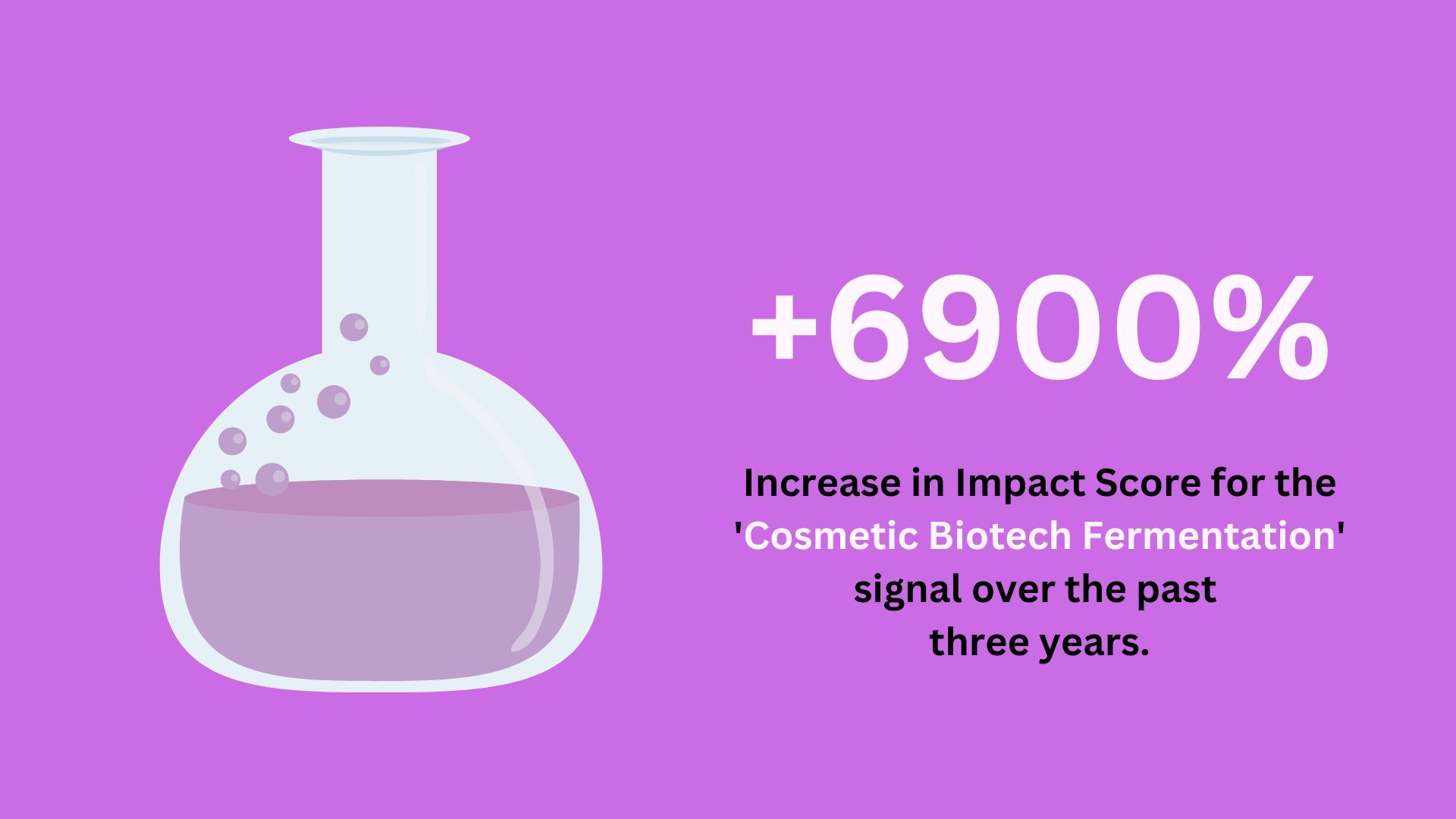
Why we chose this trend
Last week NWO.ai presented at the Sustainable Cosmetics Summit in NYC.
While we heard common themes of:
- circularity
- waste and water management
- goals based on planetary boundaries
One topic drove the innovation conversation; biotech and synthetic ingredients.
So what is ‘biotech fermentation’?
We'll keep it simple.
The process takes living organisms, like plants or bacteria, to a lab. Through biotech fermentation, these microorganisms break down organic materials into simpler compounds. The result is lab-grown novel compounds ready for use in various products at scale.
Living organisms + biotech fermentation = new product ingredients
The most common ingredient made from bacterial fermentation?
Hyaluronic acid.
And while it is possible to extract hyaluronic acid from certain foods like soy or citrus - there isn’t enough to fuel the entire beauty industry. That's why brands have turned to biotech fermentation to produce it in large quantities.
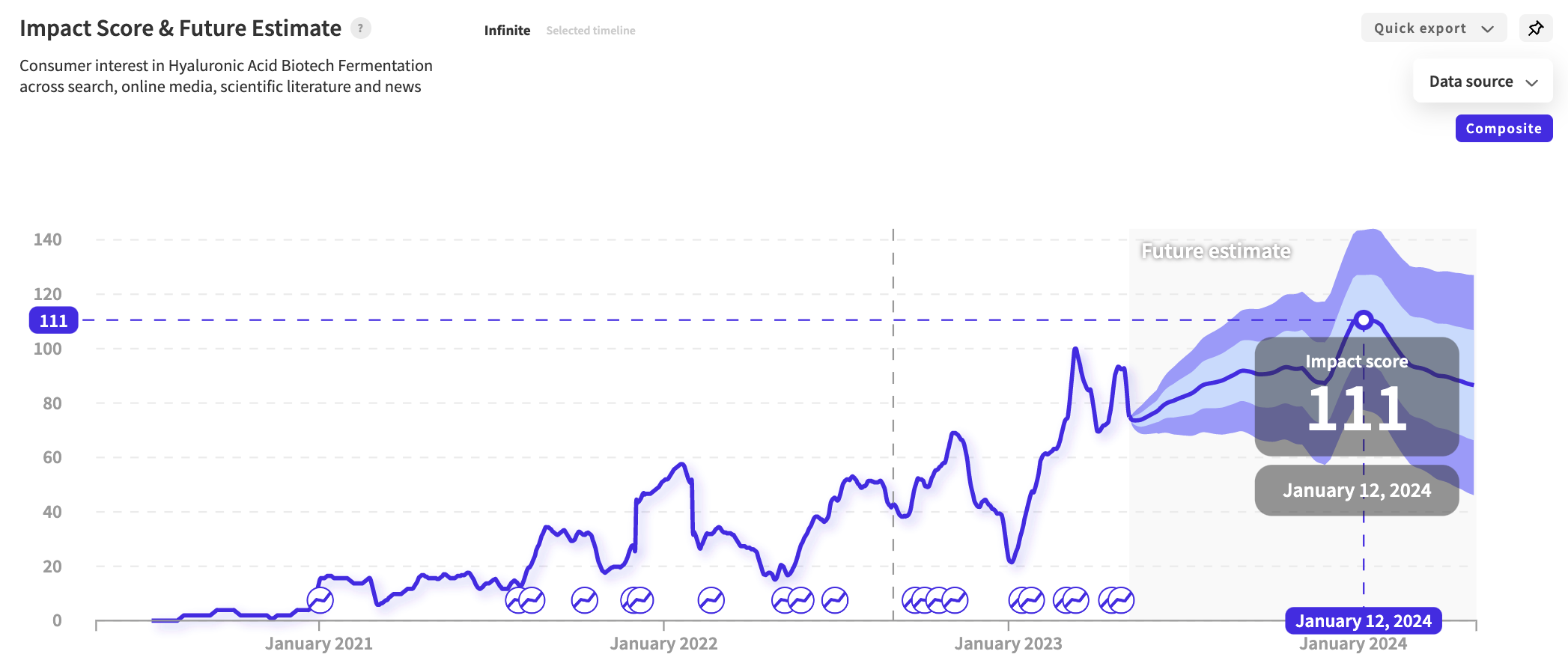
The conversation around creating hyaluronic acid through biotech fermentation has increased over the past three years and is forecast to grow within the following year.
Natural isn't always sustainable
Although fermentation inputs are naturally derived, the final compounds are technically ‘synthetic.’
This is where the beauty industry runs into issues with consumer perception.
'Synthetic' can often be a dirty word. A growing number of people prefer their products to be organic and green. Ingredients concocted in a lab are usually avoided at all costs.
The thought process goes, the less an ingredient is manipulated, the better — but this thinking has pros and cons.
Let's take fragrance as an example.
Producing a single pound of lavender essential oil can take up to 250 pounds of lavender. To make the same quantity of rose oil, you'd need 10,000 pounds. Imagine if we used natural scents for the world's supply of laundry detergent. We simply wouldn't have the supply for the demand.
Another example is the natural and infamous palm oil. Harvesting this plant clears thousands of acres of forest and displaces millions of species.
So, is it really that bad if we make it in a lab instead? The logical answer is no. But the consumer sentiment says, 'ick, synthetic.'
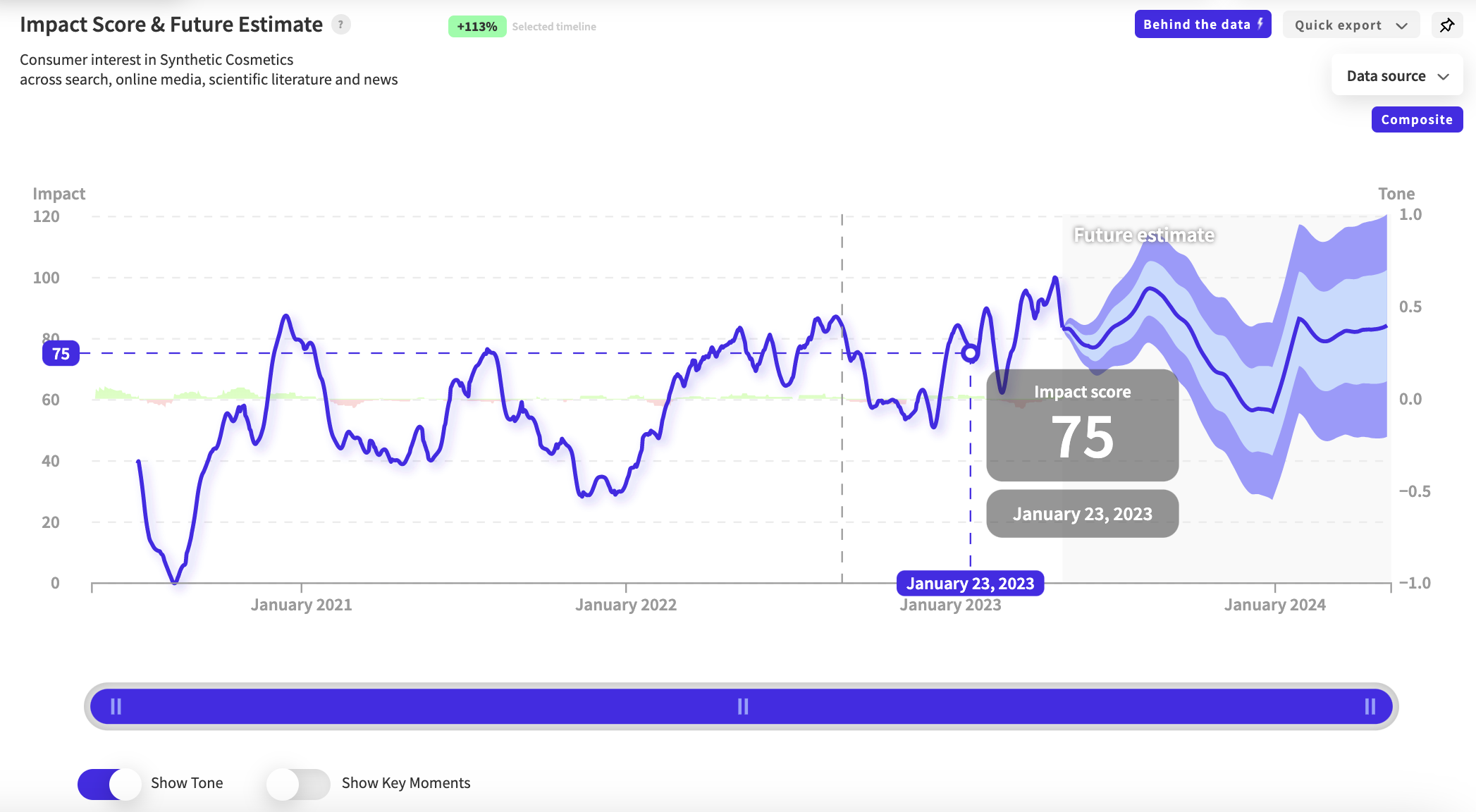
The above NWO.ai report displays the tone for the signal ‘synthetic cosmetics.’ The fluctuation between green and red means that the consumer sentiment around the topic is mixed.
But before we get into why, let's break down the benefits of synthetic ingredients, shall we?
Why is biotech fermentation better than traditional ingredient extraction?
(1) Fewer resources.
Fermentation processes use less land, water, and energy than natural ingredients. This leads to cost savings.
(2) Reduced waste.
Traditional natural ingredients rarely use the entire plant. This leaves significant waste material during the extraction, processing, and purification. In contrast, biotech fermentation can produce high-yield targeted compounds with minimal waste.
*Shout out to the company Cosun that upcycles the entire beetroot plant for their products.
(3) Controlled production.
Traditional methods are prone to variability. A company takes a risk using natural ingredients susceptible to variations in crop yield. Droughts, wildfires, and civil unrest all play a part in supply chain disruptions. Biotech fermentation allows for precise control over the production process and consistency in quality.
(4) More sustainable end products.
Overall, biotech fermentation creates ingredients with lower CO2 footprints than their traditional counterparts —especially those derived from synthetic petrochemicals, like Parabens and Phthalates.
You're starting to get the point.
Biotech is changing the game for the beauty industry
The green science revolution is here. A philosophy of science that looks to nature for its inspiration. The concept of mimicking natural processes is called ‘biomimicry.’
One company embodying this principle is Apoena.
Scientists at Apoena are curious about how natural organisms do what they do. For example, how does a coral reef protect itself from the sun? Apoena looks at consumer demands and then asks questions like:
How can we use biotech science to synthesize natural UV protection to make new sunscreens? They believe that nature has a solution for everything. Biotech helps us replicate it.
Using Biotech, we can replicate nature
Apoena is using marine organisms and biotechnology to develop sustainable compounds.
Some of their lab work ingredients include:
- Photoprotective mycosporine-like amino acids that screen out UV rays and act as an antioxidant.
- Anti-aging polyunsaturated fatty acids that repair tissue and restore collagen production.
- Skin-whitening thalassotalic acids inhibit the production of melanin.
- Exopolysaccharides (similar to hyaluronic acid)
- Preservatives Glycolipids and Lipoproteins, which act as an emulsifying delivery system.
The list goes on.
Consumer confusion
We now know that the most sustainable option is often lab-grown.
But this can be confusing for consumers. Especially since many U.S. states are considering banning cosmetics containing PFAs—described as a class of synthetic, potentially hazardous chemicals.
We can see that the majority of consumer conversation is driven by news, which is currently dominated by harmful synthetic coverage.
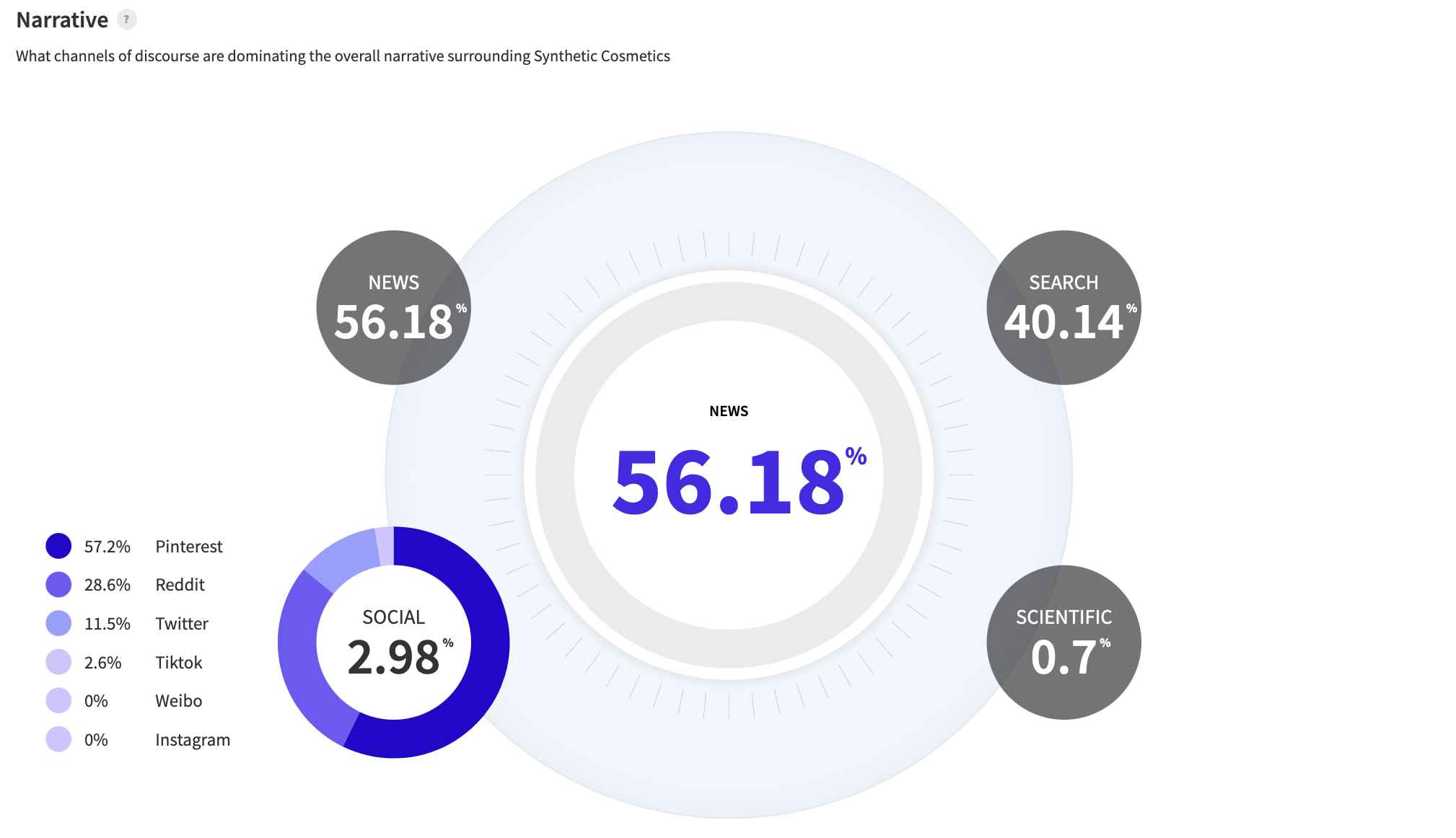
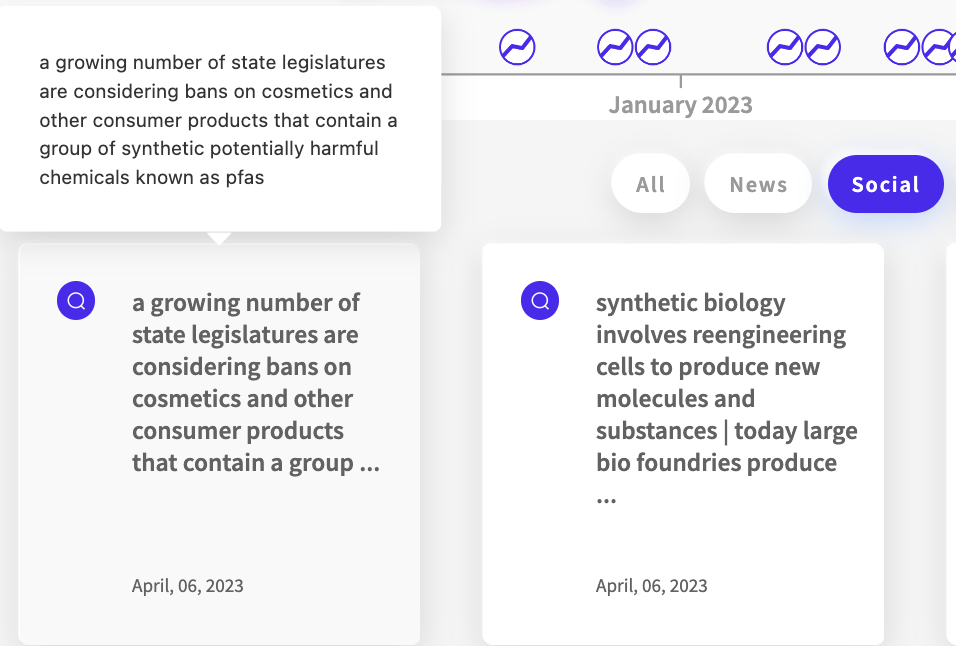
As the beauty industry relies more on biotech solutions, brands must educate their consumers better
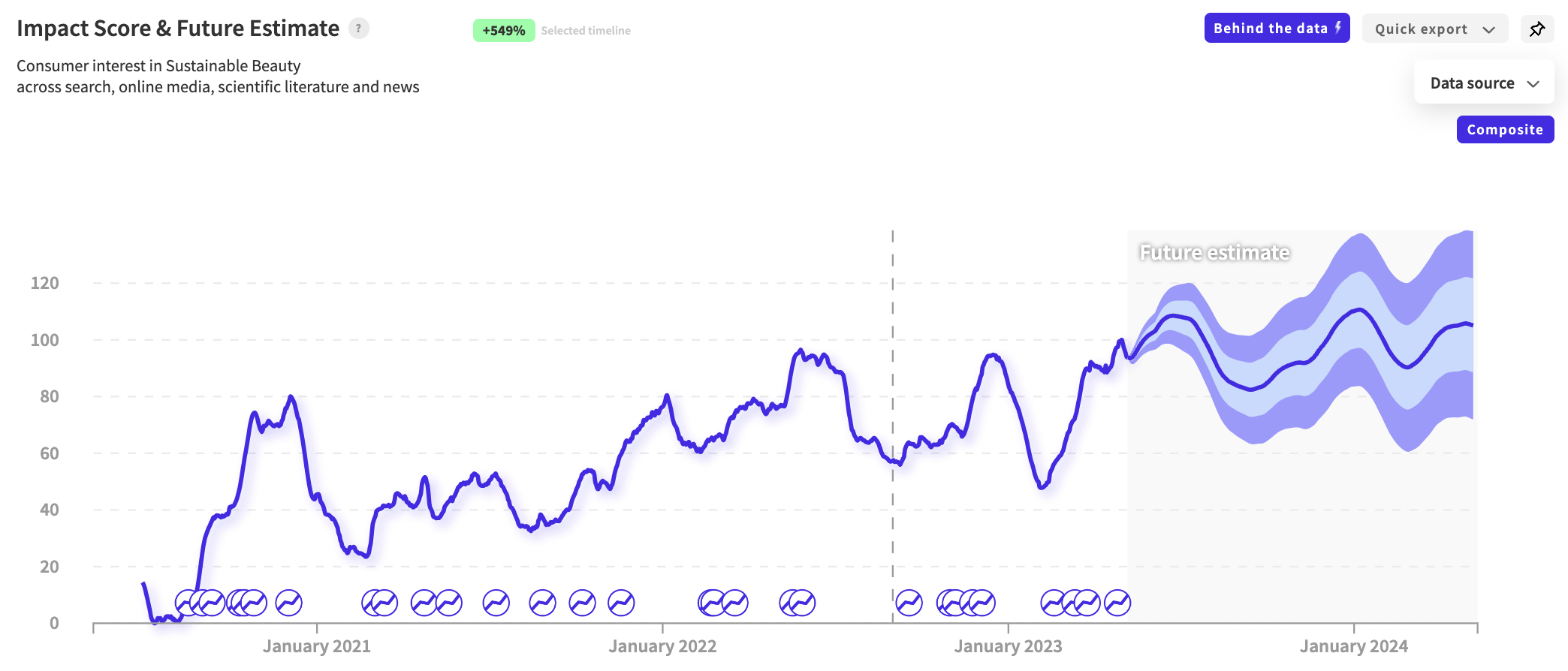
Sustainable beauty continues to grow in consumer interest. Brands will need to help consumers reframe ideas around lab-grown ingredients.
Who stands to gain from the ‘cosmetic biotech fermentation’ trend?
Companies that intentionally decide to shift to lab-grown ingredients stand to gain. Climate change, involuntary migration, and import policy all pose threats to a company’s supply chains. Securing a consistent supply of naturally derived lab-grown ingredients minimizes risk.
The Takeaway:
The green science revolution is here. Biotech offers the beauty industry innovative ways to minimize supply chain risks while attaining climate goals. Brands have a big challenge in changing the consumer sentiment around the term ‘synthetic.’
That's all we got for now.
Thanks for spending time with us on this week’s Inflection Point.
Do you find this interesting? Subscribe below or send us a note; we’d love to hear from you!